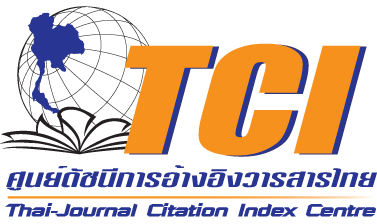Comparative Perspective of Learning Outcomes of International University Students Based on the Thai Qualifications Framework for Higher Education Standards
Keywords:
Learning Outcomes, Thai Qualifications Framework (TQF), Higher Education, ThailandAbstract
The objectives of this research were 1) to study the level of opinions on the learning outcomes according to the Thai Qualifications Framework (TQF) of students in ethics and morals, knowledge, cognitive skills, interpersonal and responsibility skills, and numerical analysis, communication, and information technology skills, and 2) to compare the differences between the opinions of students' learning outcomes according to the TQF on ethics and morals, knowledge, cognitive skills, interpersonal and responsibility skills, and numerical analysis, communication and information technology skills classified by personal factors. The sample group consisted of 315 students. Data was collected using a questionnaire. Statistics used were frequency, percentage, t-test, and one-way ANOVA POSTHOC test by Scheffe method. Most of the students are female, aged 19 to 21 years old, studying in their fourth year, with a cumulative GPA of 3.01 to 3.50, studying in the Faculty of Arts and Humanities, International Program, and having Thai nationality. The analysis of learning outcomes classified by factor variables showed that gender, age, faculties studied, and different races had no different opinions about learning outcomes according to the TQF for Higher Education. Students with different years of study had different cognitive skills and students with different cumulative GPAs had different cognitive skills, knowledge, interpersonal, and responsibility skills. In addition, students with different faculties of study had different ethics and morals, knowledge, numerical analysis, communication, and information technology skills significantly at the 0.05 level.
References
Chaiwongsa, K. (2014). Effects of integrated teaching and learning style on learning outcomes according to the Thai Qualifications Framework for Higher Education (TQF) in nutrition science subjects as perceived by nursing students. Boromarajonani College of Nursing, Udon Thani. Retrieved on April 9, 2023, from http://www.tnrr.in.th/2558/?page=result_search&record_id=10418023
Hulin, C., Netemeyer, R. & Cudeck, R. (2001, January). Can a reliability coefficient be too high? Journal of Consumer Psychology, 10(1/2), 55-58. https://doi.org/10.1207/S15327663JCP1001&2_05
Inthonnongphai S. & Khorakot, J. (2017, July-December). Learning outcomes according to the Thai Qualifications Framework for Higher Education in Bachelor’s Degree in Community Nursing Practice of Nursing Program. Journal of the Police Nurses, 9(2), 104-114. https://he01.tci-thaijo.org/index.php/policenurse/article/view/107960/85447
Khamchan, P., Thailek, T. & Thasaneesuwan, S. (2022). Learning Outcome according to Thai Qualifications Framework for Higher Education as Perceived by Nursing Students regarding the Hybrid Learning Approach in an Elementary Nursing Research Subject. Songklanagarind Journal of Nursing, 42(3), 63-73.
Khongkuntod, P., Jarupisitphaiboon, C., Kaewkulthon, N., Premasawat, N. & Phangam, M. (2020, November-December). Opinions of Employers on the Quality and Identity of New Graduated Nurses from Boromarajonani College of Nursing, Nakhon Ratchasima, Academic Year 2018. Journal of Public Health, 29(6), 1086-1094. https://thaidj.org/index.php/JHS/article/view/9625/8598
Ministry of Education. (2009). Announcement of the Ministry of Education on the Subject of Bachelor’s Degree Standard Qualification. Retrieved April 30, 2023, from https://www.ops.go.th/th/ohec-docs/mua-laws
Pragobsang, B., Juntavaree, P., Juntavaree, M., Watchana, K. & Khantha, W. (2022). Learning Outcome in Accordance with Thai Qualifications Framework for Higher Education of Dental Public Health Students Northeastern of Sirindhorn College of Public Health, Thailand. Thai Dental Nurse Journal, 33(2), 73-82.
Puengsawang, N. & Booncharoenpanich. S. (2017, May-August). Graduate quality according to the Thai Qualifications Framework for Higher Education and desirable graduate characteristics according to the identity of the Royal Thai Air Force Nursing College. Royal Thai Navy Medical Journal, 44(2), 1-17.
Registration and Student Admissions Office. (2023). Statistics of the Students. Retrieved January 2, 2023, from https://sarra.apiu.edu/Employee/StudentStatistic /StudentStatisticPage.aspx
Sirisomboon, P. (2016, July-December). Graduate characteristics according to the Thai Qualifications Framework for Higher Education of the College of Southeast Bangkok, Academic Year 2013-2014. Southeast Bangkok Journal (Humanities and Social Sciences), 2(2), 55-67. https://so05.tci-thaijo.org/index.php/SB_Journal/article/view/192951/134482
Songwattanayut, P., Kitsawat, S., Sirichot, K. & Boonluea, S. (2018, January-April). Factors related to graduate characteristics according to the Thai Qualifications Framework for Higher Education of Nursing Students of King Mongkut's College of Nursing Phetchaburi Province. Journal of King Mongkut's College of Nursing, 34(1), 57-69.
Tang-on, S. (2016, May-August). Student learning outcomes according to the Thai Qualifications Framework for Higher Education from joint lesson development using a 5-step learning process. Journal of Education Review, 31(2), 14-23.
The Higher Education Commission. (2009). Announcement of the Higher Education Commission on the Guidelines for the Implementation of the Thai Qualifications Framework for Higher Education Standard 2009. Retrieved March 31, 2023, from http://www.mua.go.th.
Vanichbuncha, V. (2022). Using SPSS for Windows to analyze data. 5th edition. Bangkok: Chulalongkorn University.
Yamane, T. (1973). Statistics: An introduction analysis. Harper & Row.







